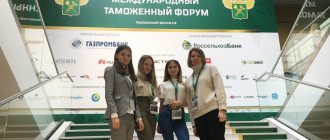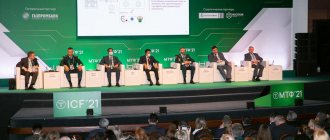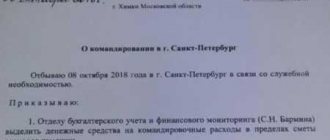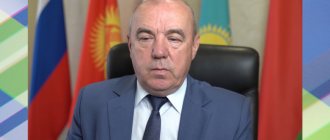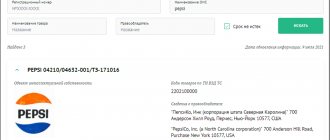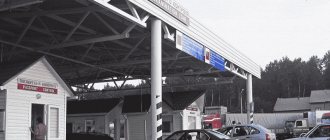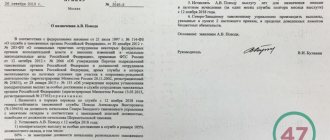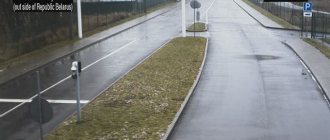International Customs Forum 2021: for the first time in a qualitatively new format
On October 24-25, 2021, in a completely new format, the International Customs Forum 2021 will be held in Moscow.
According to tradition, at the end of October the city of Moscow will host the International Customs Forum 2021 (formerly the International Exhibition “Customs Service”), which has already established itself as one of the largest and most significant events in the customs sector of our country.
From 2021, the International Exhibition “Customs Service”, which has been held in Moscow for 18 years in a row, begins to work in a qualitatively new format as an International Forum.
The largest multifunctional business complex in Russia - the International Trade Center - was chosen as the venue for the International Customs Forum - 2018 (hereinafter referred to as the Forum or ITF - 2018).
For the first time, the Forum events will be held in the format of a plenary session, panel sessions, round tables, master classes and presentations designed to facilitate the free exchange of information and opinions, as well as the development of strategies to overcome crisis situations and establish the further direction of development of customs and related industries.
The business program of the Forum can be found in detail on the official website of ITF-2018 in the section “Project Business Program” (https://www.expocustoms.ru/business_program).
Main topics on the ITF 2021 discussion platforms:
- Image of customs – 2030: Digital changes everything;
- Maisky (2018) Decree of the President of Russia and customs administration reform;
- Russia – China. Customs cooperation strategy;
- Electronic commerce. New opportunities;
- Parallel import – balance of interests;
- Customs regulation within the EAEU: balance between the national and supranational levels;
- New customs legislation: first results and future prospects;
- Current issues of collecting customs and other payments;
- Development of the transit potential of the Russian Federation;
- The Kimberley Process is a mechanism for transparency of legal international diamond trafficking. Customs aspects;
- Technical regulation in the EAEU;
- Preliminary information as a step into the future of information customs technologies;
- “End-to-end” control of goods;
- Electronic customs;
- Countering drug smuggling. Modern solutions to problems at the interdepartmental and international level;
- Categorization of foreign economic activity participants in the implementation of a risk-based approach;
- Reducing administrative and logistics restrictions in international air transportation.
This year, participation in the Forum is planned by the Government of the Russian Federation, heads of federal ministries and departments, customs authorities of foreign states, international organizations, public associations, major representatives of small and medium-sized businesses and many others.
In order to take part in the International Customs Forum 2021, you need to send an application to the Central Energy Customs by email or register yourself on the Forum website in the “Application for Participation” section (https://www.expocustoms.ru/4356 ).
You can find out more on the official website of the International Customs Forum – 2018 https://www.expocustoms.ru/
Central Energy Customs, Moscow, st. Prechistenka, 9; tel: +7 (495) 637-4018
Previous post Jukebox trio tested the actors' sense of rhythm
Next entry The work of Chinese street artists
On Customs Day of the Russian Federation, according to a long-standing tradition, the XVIII International Exhibition “Customs Service - 2017” opened in Moscow.
The opening ceremony was attended by Russian Finance Minister Anton Siluanov, head of the Russian Federal Customs Service Vladimir Bulavin and Secretary General of the World Customs Organization Kunio Mikuriya. Towards each other.
The largest customs forum in the Eurasian space was held at the Expo Fairgrounds.
The exhibition area, which occupies more than 1.5 thousand square meters, housed more than 40 stands. Among the participants are structural divisions of the Federal Customs Service of Russia, the Public Council under the Federal Customs Service of Russia, customs services of the EAEU member states, the Federal Tax Service of Russia, JSC Russian Railways, Federal State Unitary Enterprise Russian Post, Gazprombank, VTB, Otkritie, and Mercedes-Benz banks.
After the head of the Federal Customs Service congratulated his colleagues on their professional holiday, a solemn ceremony of awarding state awards to employees of the customs authorities of the Russian Federation took place.
Even before the official opening of the exhibition, a plenary session “Customs for business and the state” was held in a packed conference room. The main speaker was Vladimir Bulavin.
“Among the numerous tasks that have to be solved,” noted Vladimir Ivanovich, “there is a large group of tasks that cannot be solved without the participation of business, without interaction and mutual assistance from participants in foreign economic activity. This is reducing the administrative burden on business, promoting the development of foreign trade, increasing business activity and the investment attractiveness of the country. According to my feelings and the feelings of my colleagues over the past year, there is a positive trend. It seems to me that business and I have begun to listen to each other more and hear each other better.
In my deep conviction, the state of affairs in the customs sector is determined by two systemic key players - the Federal Customs Service and participants in foreign economic activity.
It is clear that the normalization of affairs in customs affairs, the increase in the degree of relations is a consequence of movement towards each other. We can say that over the past year we have made significant progress in this direction.
This year, the Comprehensive Development Program of the Federal Customs Service of Russia until 2021 was adopted. According to Vladimir Bulavin, this was done in close cooperation with business.
The head of the department in his speech spoke about the main aspects of the program, about the goals and objectives that customs officials have set for themselves, and how they plan to solve them.
The interesting and constructive conversation was also attended by the Director of the Department of Tax and Customs Policy of the Ministry of Finance of the Russian Federation Alexey Sazanov, the head of the working group on customs administration of the ANO Agency for Strategic Initiatives to Promote New Projects Vitaly Survillo, the Chairman of the Board of Directors of Severstal PJSC Alexey Mordashov and others.
The topic of the meeting also aroused interest among foreign guests, among whom were envoys from the customs administrations of the EAEU countries, China, Turkey, Slovakia, Estonia, South Africa and other countries.
The most important event of the exhibition’s business program was the signing at the stand of the Public Council at the Federal Customs Service of Russia of the Declaration of Support for the Charter of Bona fide Participants in Foreign Economic Activity.
The declaration was signed by the heads of the largest Russian business associations - Alexander Shokhin (RSPP), Sergey Katyrin (RF CCI), Alexey Repik (Business Russia) and Alexander Kalinin (Opora Rossii).
Participants in the charter undertake to refrain from submitting false information about declared goods to customs authorities and advocate a zero-tolerance attitude towards those who try to gain competitive advantages through customs evasion and other unfair practices. Russian and foreign legal entities and individual entrepreneurs can join the charter. The register of charter participants is maintained by the Public Council under the Federal Customs Service of Russia.
Anton Siluanov and Vladimir Bulavin welcomed the initiative of the business community and expressed confidence that for many entrepreneurs the charter will serve as a moral and business guideline for the successful conduct of foreign economic activity.
At the same time, President of the RF CCI Sergei Katyrin expressed confidence that as the risk-based approach is introduced into the work of customs, it is the conscientious companies that will benefit “also because they will be checked less often.”
Shrines remain in their homeland
On the first day of the exhibition, according to established tradition, Vladimir Bulavin handed over to representatives of the Russian Orthodox Church cultural values detained during attempts to illegally move them across the border. Eleven icons of the 18th – 20th centuries were seized from smugglers by Sheremetyevo customs: the icons “Apostles Peter and Paul” (XVIII century), “Miracle of St. George about the serpent" (XIX century), "Do not weep for Me, Mother" (XIX century), icons of the Mother of God "Joy of All Who Sorrow" (XIX century), "The Sign" (XIX century), "Unexpected Joy", with selected saints (turn of the 20th century), “It is worthy to eat” (turn of the 20th century), “Iverskaya” (20th century), “Kazan” (20th century), as well as two icons with selected saints in prayer to the Mother of God of Kazan (20th century).
The icons were examined at the Andrei Rublev Museum of Ancient Russian Art. All of them are recognized as cultural values and have now been transferred to the Synodal Department for interaction with the armed forces and law enforcement agencies. Representatives of the Russian Orthodox Church warmly thanked customs officers for their work, thanks to which the shrines of the Russian Orthodox Church remain in their homeland.
As usual, the exhibition has become a good platform for business partnerships and the conclusion of mutually beneficial cooperation agreements. For example, the Eurasian Association of Guarantors “GARANT” and the Global Transit Organization “GTO” are joining forces.
Executive Director of EAP Garant Sergey Frolov and General Director of GTO Marek Retelski signed an important partnership agreement between the two associations.
According to Sergei Frolov, this partnership, in particular, will benefit from the international experience of the Global Transit Organization in matters of customs guarantees to facilitate the creation of a unified system of guarantees for the payment of customs duties and taxes in the territory of the Eurasian Economic Union. At the same time, such a system will ensure the reliability and transparency of various guarantee institutions, as well as the protection of the interests of members before national and international authorities, minimizing the risks of non-payment of customs duties to the budgets of countries.
Among the special guests of the exhibition is the International Federation of Football Associations (FIFA). This organization was presented at the stand of the Department of Customs Restrictions, Currency and Export Control of the Federal Customs Service of Russia. For identifying counterfeit goods with FIFA trademarks during the preparation for the 2018 FIFA World Cup, Russian customs officers were presented with awards from the International Football Federation, and a number of regional customs authorities received gratitude “for their cooperation and support in the implementation of the FIFA Brand Protection Program in Russia.”
The busy business program of the exhibition was continued with a panel discussion “Novelties of the Customs Code”. The speakers, among whom the report by Deputy Head of the Federal Customs Service of Russia Tatyana Golendeeva had the greatest resonance, spoke about the entry into force of the EAEU Customs Code in January 2021, the provisions of which radically change approaches to customs regulation.
As part of the business program of the first day of the exhibition, a round table was also held on the topic: “Technical regulation in the EAEU as an integration tool.”
Of great interest to all participants and guests of the exhibition “Customs Service - 2017” were the stands demonstrating modern information customs technologies of the Federal Customs Service of Russia, including the “Personal Account of a Foreign Economic Activity Participant” and the “Sea Port Portal”, which implements the “single window” principle.
The exhibition clearly presents the results of the implementation of information technologies, including: the functioning of the Unified State Automated Information System within the framework of interaction between the Federal Customs Service of Russia and Rosalkogolregulirovanie, categorization of participants in foreign economic activity and the risk management system, traceability of goods and interaction with the Federal Tax Service of Russia, protection of intellectual property rights and information interaction of the Federal Customs Service of Russia with copyright holders , administration of customs payments, application of electronic bank guarantees. At the end of the first day of the exhibition, Vladimir Bulavin examined the stands and talked with its participants.
In electronic format
The round table on the topic “Current issues of determining and monitoring the basis for accrual and payment of customs and other payments administered by customs authorities” was attended by Deputy Head of the Federal Customs Service of Russia Timur Maksimov, Head of the Main Directorate of Federal Customs Revenue and Tariff Regulation of the Federal Customs Service of Russia Olga Komarova, Deputy Head of the Department commodity nomenclature of the Federal Customs Service of Russia Larisa Sarkisova, Deputy Head of the Analytical Department of the Federal Customs Service of Russia Alexander Guskov.
Alexander Guskov spoke about the EAEU customs code, determination and control of customs value.
He spoke in detail about the procedure for declaring the customs value of the EAEU Customs Code, the procedure for controlling the customs value of the EAEU Customs Code, as well as the receipt, systematization and analysis of price information.
Deputy Head of the Federal Customs Service of Russia Timur Maksimov emphasized that one often hears from business representatives about different law enforcement practices of customs value.
“This problem is systemic in nature, and sometimes this is abused locally, punishing some participants in foreign economic activity,” noted the deputy head of the Federal Customs Service of Russia. – In fact, the actions of the customs inspector are understandable.
He must take the maximum amount of security. But it is important to understand from what base he counts. There really is a problem. Firstly, we are ready to respond flexibly to incoming business signals. A pilot project has now been launched in the Far East. It is important that when we move from 672 customs clearance points to 16 CEDs, it will be much easier to control the quality of decisions made, ensure uniform practice in controlling customs value, and calculating the amount of security. We are counting on this and in the future, in three to four years this problem should disappear. The key message is simple and convenient conditions for business, including uniform practices. Our systemic measures are CEDs, as well as building fairly strict control vertically up to the structural divisions of the Federal Customs Service of Russia. This work is now given great importance and it is planned to continue it.
Deputy Head of the Department of Commodity Nomenclature of the Federal Customs Service of Russia Larisa Sarkisova revealed the issue of the average time for making preliminary decisions on the classification of goods by year and customs authorities, reported on the number of decisions on the classification of goods transported in the form of components, and also drew attention to the issues that arise when considering an application for making decisions on the classification of goods.
The topic of the role of the institution of customs representatives in the practice of customs administration was touched upon by the First Deputy Chairman of the Board of the Guild of Foreign Trade Professionals Hermes Evgeniy Koshkarov.
He drew attention to the main functions of a customs representative, as well as methods of customs clearance for various types of foreign trade participants.
Questions from foreign trade participants were about the special customs procedure, about filling out a declaration of customs value, about a single personal account, about customs duties and others.
In response to a question from Customs magazine about the most sensitive issues for business raised at the round table, Deputy Head of the Federal Customs Service of Russia Timur Maksimov summarized that the most important issue of concern to foreign trade participants is uniformity in determining customs value and how this uniformity will be ensured, what measures are already being taken and how new legislation should help.
“When goods with different values can be declared and released in different regions of the country, then, of course, this is wrong,” noted the deputy head of the Federal Customs Service of Russia. – There are probably objective reasons, but when the customs value is cleared of all factors that must also be declared, such as insurance, transportation, expedition, then the range of this value should not differ much across the regions of Russia. The customs administration reform that is planned is aimed, among other things, at ensuring uniformity, since we will collect all customs clearance in 16 CEDs and monitoring them in terms of the quality and uniformity of decisions made is much easier than the 672 points that currently exist.
An open dialogue with the audience continued throughout the event. Moderator Elena Tsvetkova thanked the speakers for their informative presentations, and the participants for the lively discussion and topical questions.
Interaction is excellent
On the second day of the exhibition, another significant event took place. First Deputy Head of the Federal Customs Service of Russia Ruslan Davydov and Deputy General Director for Logistics of the Federal State Unitary Enterprise "Russian Post" Alexey Skatin jointly pressed a symbolic button to launch an experimental line for processing MPO at remote workplaces of customs officials. After this, a commemorative cancellation of postal products took place.
The panel discussion “Customs Technologies: Yesterday, Today, Tomorrow” was devoted to the issues of electronic declaration, remote release of goods, the single window mechanism, technology for automatic registration of goods declarations and automatic release. The participants discussed the experience of interdepartmental interaction and cooperation with such major partners as FSUE Russian Post and JSC Russian Railways.
The moderator of the discussion, Chairman of the Public Council under the Federal Customs Service of Russia Leonid Lozbenko, in his opening remarks, recalled the important event that took place the day before - the signing of the Charter of Bona fide Participants in Foreign Economic Activity. This became an important step for the Federal Customs Service of Russia and business towards each other.
Ruslan Davydov spoke about the main tasks facing Russian customs to implement the Comprehensive Development Program of the Federal Customs Service of Russia for the period until 2021.
This is, first of all, automation, concentration of work in electronic declaration centers, introduction of single window mechanisms, development of post-control, improvement of categorization.
According to Ruslan Davydov, information technologies of customs authorities are in demand by participants in foreign trade activities.
Thus, the number of users of the “Personal Account of a Foreign Trade Participant” service increases weekly by an average of 1000. The task is to increase the efficiency and effectiveness of the application of the risk management system (RMS).
It is intended to bring the control system to such a level that all control measures are carried out only as a result of its activation.
Cooperation with the Federal Tax Service is of particular importance. In the RMS, customs authorities actively use information received from the Federal Tax Service of Russia, and in the future it is planned to follow the path of further convergence of the two services, their interpenetration and mutual enrichment of information.
Deputy Head of the Federal Tax Service of Russia Daniil Egorov spoke about how the agency’s working conditions and, as a result, efficiency and effectiveness have changed in connection with the development of electronic document management.
The discussion was attended by Deputy General Director for Logistics of the Federal State Unitary Enterprise "Russian Post" Alexey Skatin, Head of the Department of Customs Infrastructure of the Eurasian Economic Commission Alexander Galanamatis and Director of Russian Railways for Commercial Activities - General Director of the Center for Branded Transport Services Alexey Shilo.
The topics of the panel discussion “Law enforcement activities of customs authorities” were the introduction of a new service in the information system of customs authorities for participants in foreign trade activities, as well as the results of the work of law enforcement units with citizens’ appeals. Deputy Head of the Federal Customs Service of Russia Anatoly Seryshev spoke about the analytical work carried out by law enforcement units of the Federal Customs Service of Russia in 2017, which made it possible to stop the largest channels for the supply of contraband products to the Russian Federation, and introduced the audience to the main results of the work of the law enforcement unit.
Thus, over the past period of 2021, 1,747 criminal cases and 84 thousand cases of accidents were initiated. Goods worth 11.5 billion rubles were seized.
Head of the Customs Investigation and Inquiry Department of the Federal Customs Service of Russia Alexander Kizlyk announced plans to launch the Administrative Offenses information service by the beginning of 2021. It will expand interaction between customs authorities and participants in foreign trade activities.
In his speech, the head of the Main Directorate for Combating Smuggling of the Federal Customs Service of Russia, Andrei Yudintsev, said that along with operational information received from information and analytical units, from other departments and from foreign colleagues, it is of great importance and value for the suppression of illegal actions, prevention and crimes have been solved by citizens.
The business program of the exhibition was completed by reports from the deputy head of the information and analytical department of the UTRD FCS of Russia Maxim Kashin and the deputy head of the organizational and analytical department of the organizational and inspection service of the State Budgetary Inspectorate of the Federal Customs Service of Russia Dmitry Fedchenkov.
Source: Customs magazine No. 24 2021
